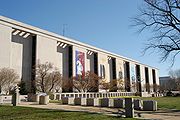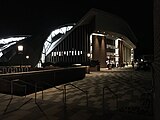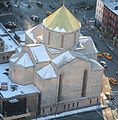Walker O. Cain
Walker O. Cain | |
|---|---|
 | |
| Born | Walker Oscar Cain April 14, 1915 Cleveland, Ohio |
| Died | June 1, 1993 Southampton, New York |
| Nationality | American |
| Occupation | Architect |
| Practice |
|
| Buildings |
|
Walker O. Cain , FAIA, FAAR, NA (April 14, 1915 – June 1, 1993) was a prize-winning American architect.
Biography
Early life and education
Cain was born in Cleveland, Ohio, the son of Oscar C. Cain (1877-1954), a postal clerk for the railroad, and his wife Meta M. Gusse.[1] He studied architecture for five years on a scholarship at Case Western Reserve University (B.Arch. 1938), and for two years at Princeton University (M.F.A. 1940). A brother, Howard B. Cain, also an architect, was for a time the president of the Cleveland chapter of the American Institute of Architects. A nephew, Bruce Cain, was an architect for many years with the US Naval Department.
During the summer of 1937, having won the Schweinfurth Traveling Scholarship (awarded annually by the school of architecture at Case Western), Cain traveled to France to study at the School of Fine Arts at Fontainbleau.[2] At the conclusion of his course, he visited Italy, leaving Trieste aboard the SS Saturnia on September 20, arriving in the Port of New York on October 4.[3]
In 1939, he received the Henry Adams Medal from the American Institute of Architects, awarded to the best student in each accredited architecture program, and in 1940, he won the competition for the Rome Prize of the American Academy in Rome (having won honorable mention in 1938 and 1939).[4]
Architectural career
After graduating from Princeton, and unable to travel to Rome on account of the war in Europe,[5] Cain moved to New York to join the firm of McKim, Mead & White. He was named an associate in 1951,[6] and after the death in February 1961 of James Kellum Smith, the firm’s last surviving partner, several of the firm’s senior employees, including Cain,[7] formed the firm Steinmann, Cain and White, in order to complete the older firm’s outstanding projects. Cornelius White (no relation to Stanford White) died in 1962, and in 1965, the firm reorganized as Steinmann and Cain, succeeded in 1967 by Walker O. Cain & Associates.
Honors
Walker Cain was made a fellow of the American Institute of Architects in 1968. He was elected chairman of the board of the American Academy in Rome in 1974 and served in that capacity until 1984. In 1962, he was elected an Associate National Academician, and in 1975, a full National Academician by the membership of the National Academy of Design.
Personal life
In June 1941, Walker Cain married Abby Jane Huston (the marriage was dissolved by divorce). They had two children, Susan Berry Cain and Tamma Huston Cain.
On July 27, 1973, He married Elizabeth Douglas McCall (1919-1996).[8] According to The New York Times:
The Rev. William A. McQuoid performed the ceremony in the Dana Chapel of the Madison Avenue Presbyterian Church. He was assisted by the Rev. Dr. John C. Coburn, rector of St. James' Episcopal Church. The bride, daughter of Mrs. Arthur May McCall of Florence, S. C., and the late Mr. McCall, was divorced from Arthur A. Houghton Jr., board chairman of Steuben Glass. The bridegroom, son of Mrs. Oscar C. Cain of Cleveland and the late Mr. Cain, also has been previously married and divorced. He is senior partner of Walker O. Cain Associates, an architectural firm here.[9]
His second marriage brought Cain yet another honor. A reporter for the Times noted that the 1974 edition of the Social Register "contains few surprises," while observing that,
As usual, some names have been dropped and others added, as a rule through marriage to people already listed...Arthur A. Houghton Jr., board chairman of Steuben Glass, and his former wife, Mrs. Elizabeth McCall Houghton, both remarried in 1973 and their new spouses, the former Mrs. Nina Rodale Horstmann, and Walker O. Cain, a New York architect, were welcomed to the fold.[10]
Walker Cain died in Southampton, New York in 1993. Elizabeth Cain died in New York City in 1996.
Notable works
McKim, Mead & White
In his Who's Who in America, 1972-1973 entry, Cain listed among his built works projects completed before McKim, Mead & White’s dissolution in 1961. These include:
- Jafet Library, American University of Beirut, Lebanon (completed 1951); McKim, Mead & White.
- Schaffer Library, Union College, Schenectady, NY (dedicated April 29, 1961); McKim, Mead & White.[11]
Steinmann, Cain and White (and successor firms)
Projects completed after 1961 include:
- Caldwell Field House, Princeton University (completed 1963); Steinmann, Cain and White.
- Museum of History and Technology, Smithsonian Institution, Washington D.C. (completed 1964); begun McKim, Mead & White; completed Steinmann, Cain and White.[12]
- Hawthorne-Longfellow Library, Bowdoin College, Brunswick, Maine (completed 1965); Steinmann, Cain and White.[13]
- Princeton University Museum and Fine Arts Library (completed 1966); Steinmann and Cain.
- St. Vartan Armenian Cathedral, Second Avenue and 34th Street, Manhattan (begun 1963; consecrated 1968); Steinmann, Cain and White.[14]
- Jadwin Gymnasium, Princeton University (begun 1964; completed 1969); Walker O. Cain and Associates.
- Computing Center, Princeton University (completed 1970).[15]
- Casco National Bank Building, Portland, Maine (completed 1970); Walker O. Cain and Associates.[16]
- the Maine State Museum, Augusta, Maine (dedicated 1971); Walker O. Cain and Associates.[17]
- Maynard Building, Brooklyn, NY (completed 1976); Walker O. Cain and Associates[18]
- Mickel Library, Converse College, Spartanburg, South Carolina (completed 1980); Walker O. Cain, of Cain, Farrell and Bell.[19]
Cain was a skilled architectural renderer. Among the many examples are the drawings he made of the collegiate chapter houses of St. Anthony Hall (aka Delta Psi fraternity ) for their 1947 membership directory.
Gallery
-
Schaffer Library, Union College — photo September 2009.
-
The Museum of History and Technology (later renamed the National Museum of American History) — photo March 2006.
-
The Princeton University Art Museum — photo June 2010.
-
St. Vartan Armenian Cathedral — photo July 2010.
-
Jadwin Gymnasium — photo December 2018.
-
St. Vartan Armenian Cathedral — photo November 2011.
-
Maine State Library and Museum — photo August 2008.
-
The Hawthorne-Longfellow Library of Bowdoin College — photo April 2010.
-
One Monument Square in Portland, Maine (signed Pierce Atwood) at left — photo February 2008.
Bibliography
- Fred N. Severud (author) and Walker O. Cain (illustrator), "Forecasting a New Era For Concrete," Architectural Record, Vol 106, No 6 (December 1949).
- E. Powis Jones (author) and Walker O. Cain (illustrator). Favorite Fountains in New York City: a Guide to Artistic and Unusual Fountains in the City’s Parks, (Park Association of New York City, 1963).
References
- ^ U.S. Census, 1920 and 1930
- ^ Honan, William H. (June 4, 1993). "Walker O. Cain, Architect, Dies; Recipient of Rome Prize Was 78". The New York Times. Retrieved February 22, 2023.
- ^ "New York, New York Passenger and Crew Lists, 1909, 1925-1957," database with images, FamilySearch (https://familysearch.org/ark:/61903/1:1:24KY-QF8 : 2 March 2021), Walker Cain, 1937; citing Immigration, New York, New York, United States, NARA microfilm publication T715 (Washington, D.C.: National Archives and Records Administration, n.d.).
- ^ "American Academy Makes Rome Award". June 4, 1940. Retrieved February 3, 2022.
- ^ Cain deferred his fellowship at the Academy to 1948.
- ^ "Office Notes," Architectural Record (February 1951).
- ^ The others were: Milton Bode Steinmann (1899–1987), Cornelius J. White (ca 1894–1962), and Alexander Stevenson Corrigil (1891–1961).
- ^ Who's Who in America 1992–1993 (New Providence, NJ: Marquis Who's Who, 1992), p.502.
- ^ "Mrs. Houghton Married Here". Retrieved February 3, 2022.
- ^ "'74 Social Register Has Few Surprises". Retrieved February 3, 2022.
- ^ The Schaffer Library. WorldCat. OCLC 13729601.
- ^ Infinity in Eight Minutes - TIME
- ^ Anderson, Patricia McGraw (1988). The Architecture of Bowdoin College. Brunswick, Maine: Bowdoin College Museum of Art. pp. 63–66. Retrieved February 5, 2022.
- ^ The Armenian Church | St. Vartan Cathedral
- ^ Princeton - Campus Building Architects
- ^ "One Monument Square, Portland, Maine". Emporis. Archived from the original on June 17, 2019. Retrieved February 7, 2022.
- ^ "Stated of Maine Library, Museum, Archives Building, Dedication Brochure". Maine State Library. Retrieved February 5, 2022.
- ^ "Maynard Building, New York City". Emporis. Archived from the original on June 12, 2021. Retrieved February 7, 2022.
- ^ "Library History, Converse University". Retrieved February 5, 2022.









